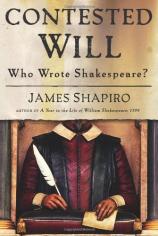Contested Will: Who Wrote Shakespeare?
Review
Contested Will: Who Wrote Shakespeare?
For many years, a gentle joke has circulated in academic
circles. The plays of William Shakespeare, it says, were not
written by Shakespeare, but by another man of the same name. Not a
very good joke, for sure, but a reminder that the controversy over
authorship of those immortal plays and sonnets still thrives today.
Shakespeare scholar James Shapiro tells us that some 50 different
candidates have been suggested as the “real” author of
the Shakespeare canon.
Shapiro himself is not a doubter --- he tells us right up front
that he thinks “the Stratford man” did indeed write
Shakespeare --- and in the epilogue to this intriguing book, he
gets down to the business of debunking the standard arguments
against that idea. But in between, Shapiro’s interest is more
in the contest itself than in its resolution. Why did the question
arise in the first place? What has kept it alive for all these
years? What does it mean for us today?
Shapiro’s narrative enlists a cast of characters as varied
as that of any Shakespeare drama, for among the doubters over the
years, we find such heavyweights as Mark Twain, Sigmund Freud, Walt
Whitman, Henry James and Charlie Chaplin. Alongside them stands a
gallery of lesser known, colorful eccentrics like Delia Bacon, John
Thomas Looney and Hank Whittemore; some of them at least are
credible scholars, but several verge on literary fraud-merchants.
There have indeed been several instances of large-scale forgery by
doubters, as well as proposals to disinter the bodies of
centuries-dead candidates, and even assertions that evidence has
been obtained from the claimants themselves through psychic
séances.
Anti-Stratford zealots have labored long and hard to find
supportive messages encoded in the plays themselves, some of them
decipherable only by the use of complicated machinery. Their
rhetoric can sometimes approach Tea Party levels of venom as
doubters dismiss Shakespeare of Stratford as “that
booby,” “the Stratford poacher” and “that
grossly commercial wool-stapler.” Shapiro himself is more
restrained. He launches no verbal spitballs at the doubters and
even treats one of them, a strange but somehow appealing character
named John Thomas Looney, with genuine respect. An early entry on
the field of literary battle, Edmond Malone emerges as both hero
and villain because he stood up for Shakespeare of Stratford as the
true author, but also promoted the idea that his plays could be
read for clues to his life. The whole authorship dispute is a real
one, but unlike real warfare, it can be conducted with some
civility.
Shapiro concentrates on two of the best-known and most widely
supported authorship candidates --- Sir Francis Bacon and Edward de
Vere, the Earl of Oxford --- leaving aside fringe candidates like
John Donne, Christopher Marlowe, Sir Walter Raleigh and Queen
Elizabeth herself. He has listened patiently to all the standard
anti-Stratford arguments and quotes them quite extensively. He has
also thoroughly ransacked scholarly commentary on the matter (his
bibliographical essay at the book’s end runs to 40 pages). He
is especially hard on the habit many doubters adopt of seeking
autobiographical clues in the plays themselves, an exercise he
dismisses as an “unprofitable game.” One of the major
factors in this whole affair, of course, is the scarcity of really
relevant written evidence of the man Shakespeare himself. He is to
some extent a blank slate on which lots of people are scribbling to
this very day.
Shapiro’s final clinching argument, however, is a neat
blend of scholarship with gut feeling. The doubters, Shapiro
concludes, seek to deny Shakespeare of Stratford “the very
thing that makes him so exceptional --- his imagination.”
Certainly he may have been poorly educated (though even that is
uncertain), but he had both the means and the questioning mind to
soak up all the vast range of learning that the plays exhibit.
James Shapiro is a conscientious scholar and a good writer. His
book will certainly be of great interest both to Shakespeare
enthusiasts and detractors, but even those who just enjoy a complex
and many-sided mystery will find it engrossing.
Reviewed by Robert Finn (Robertfinn@aol.com) on December 28, 2010
Contested Will: Who Wrote Shakespeare?
- Publication Date: April 6, 2010
- Genres: History, Nonfiction
- Hardcover: 352 pages
- Publisher: Simon & Schuster
- ISBN-10: 1416541624
- ISBN-13: 9781416541622




